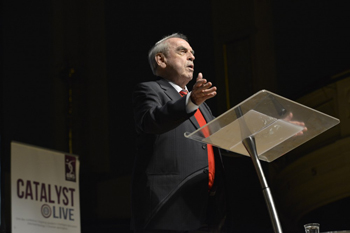
In a dense, poetic, often moving address, Professor Moltmann asserted that the Christian hope in the future is not like the utopias of some political ideologies or the apocalyptic visions of some forms of religion, because we look forward not to an end of things, but to a beginning. 'We can say yes to the future whatever may come, in the light of Christ’s Resurrection,' he said.
Reflecting on his own conversion experience as a captured German soldier in a labour camp in Kilmarnock during the Second World War, the author of
The theology of Hope said that even behind barbed wire in 1945, the Spirit of life touched him through Psalm 39, and, 'my anguish increased, and my heart grew hot in me.'
Later, in reading of Jesus’ death on the cross, Moltmann heard: 'an echo of my own soul,' and felt the growing conviction that Christ was 'one who understands you and is with you in your crying.'
When he returned to Germany, he had 'a passion for life' and was 'reborn to a living hope.'
Contrasting Christian hope with what he called 'the sad sin of despair,' Professor Moltmann said that the 'self-made sickness' of resignation and despondency leads to many vices, and that, 'hopeless and brutality are often two sides of the same coin.' In contrast to the arrogance of power in original sin, apathy, he said, is 'the arrogance of the powerless.'
Professor Moltmann told audiences of ministers and laypeople: “If you hope nothing you can’t be disappointed, but you miss living,” and likened the image of hope to that of the birth of new life in the world.
He concluded his address by saying: 'as long as I breathe, I hope.'